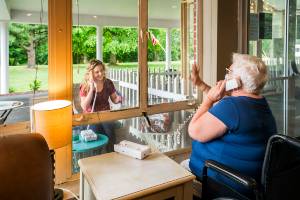 The COVID-19 virus is particularly deadly for the elderly and those with compromised immune systems. Nursing home residents are both old and in physical decline, putting them at high risk for suffering serious consequences if they contract this virus.
The COVID-19 virus is particularly deadly for the elderly and those with compromised immune systems. Nursing home residents are both old and in physical decline, putting them at high risk for suffering serious consequences if they contract this virus.
Unfortunately, more than 170,000 nursing home residents and staff members have contracted the virus and passed away. This revealed nursing homes were not only unprepared to handle a virus, but also unable to provide adequate care for their residents.
According to Robert Kramer, founder of a long-term care consulting firm, “Covid didn’t make it dysfunctional, but Covid showed that it was broken and dysfunctional.”
Below, learn more about how the pandemic highlighted the problems in our nation’s nursing homes. If you have a loved one in a nursing home, it is important to know about the risk factors. It is often up to loved ones to prevent abuse or report abuse after it has already occurred.
Understaffing Before and During the Pandemic
Understaffing has plagued the nursing home and long-term care industry for many years. When there are not enough staff members to provide adequate care for residents, serious and even life-threatening injuries are more likely to occur. Residents’ mental and social well-being can also be affected, which can have a negative effect on their quality of life.
However, nursing home caregivers are often not compensated well, which makes it hard to fill these positions. Nursing homes also do not hire enough staff members to keep up with the needs of their residents.
Caregivers and others are often overworked, which may make them more likely to lose their patience and lash out at residents. Being overworked does not excuse abuse, but it is important to understand why it often happens.
There is also high turnover at nursing homes. When it is already tough to fill positions, high turnover just makes it more likely facilities will be understaffed.
Nursing homes have been breeding grounds for the COVID-19 pandemic because caregivers often work at multiple facilities. They would bring the virus with them from one facility to another.
Some nursing homes used staffing agencies to fill positions. However, workers brought in through staffing agencies would only work at facilities temporarily. Often taking temporary positions at multiple nursing homes. In some cases, staffing agencies paid workers better than the nursing homes themselves.
Problems at For-Profit Facilities
Studies have shown for-profit nursing homes were more likely to have COVID-19 cases than nonprofit facilities. This is not necessarily due to neglect or other issues – for-profit facilities typically serve more people than nonprofit facilities. This includes more Medicaid patients.
However, reporting requirements for nursing homes have also shown for-profit facilities often spend less on direct care for residents. These reporting requirements also show staff members spend less time with residents.
Unfortunately, data on nursing homes, for-profit and otherwise, is often incomplete and unreliable. That makes it harder to pinpoint all the problems that need to be addressed.
Signs of Understaffing to Watch for
When you visit your loved one at a nursing home, you may be able to spot signs of understaffing, such as:
- Phones ringing and not being answered
- New staff members you do not recognize (understaffed facilities often have high staff turnover)
- Empty hallways and long periods of time where you do not see staff members
- Messy, cluttered rooms and hallways, which could be a sign of staff members not doing their jobs or being overwhelmed because there are not enough staff members
- Malnourished or dehydrated residents
- Many residents being by themselves
- Frequent falls
- Bedsores
- Behavior changes in your loved one, such as depression from being ignored for long periods of time
If you notice any of these things, you should investigate to find out what is going on. Family and friends of residents are often the ones who raise concerns about the care provided at nursing homes. It is possible reporting the situation to administrators may result in change. At the very least, formally reporting problems helps create a record that may help later if you need to take legal action.
Has Your Elderly Loved One Been Abused or Neglected? Call Today
The Harrisburg nursing home abuse attorneys at Schmidt Kramer are prepared to help you seek compensation and hold the nursing home accountable. The initial consultation is free of charge and comes with no obligation to hire our firm.
Contacting a lawyer can be an important step as you figure out what to do next. At Schmidt Kramer, we understand this is a difficult time and are here to help.
Call today to learn more: (717) 888-8888.

